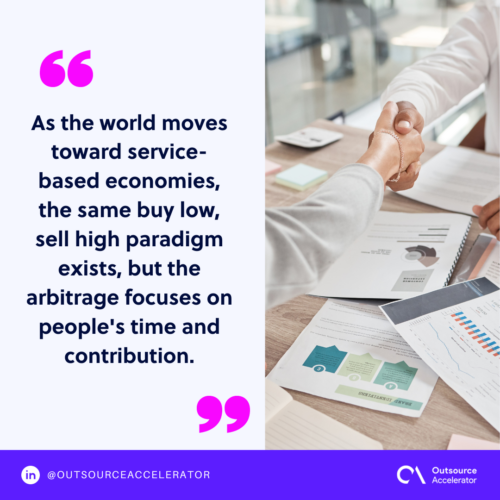Tax Day is done! Step away from your calculators and spreadsheets and spend Wednesday with our newest Gone Global edition. We promise there are no calculations to be made here. 😉
Buying Low, selling high
Buy low, sell high.
It’s the basic formula of trade, and has served the world well for the last few thousand years.
However, most businesses go beyond basic trading and add value to their product or service before reselling it. So the formula becomes:
Buy low ⇨ add value ⇨ sell high.
Regardless, the fundamental of buying low and selling high is sacrosanct.
Walmart, Costco, and Amazon exist on the basis of sourcing products from cheaper destinations, and selling them at a margin to the local market. It’s no wonder that the vast majority of global manufacturing happens in cheaper countries, like China, Turkey, and India, in support of this.
As the world moves toward service-based economies, the same buy low, sell high paradigm exists, but the arbitrage focuses on people’s time and contribution. Companies hire staff at one rate, package their production, and sell it at another, higher rate.

Today, with global internet connectivity, digital-first workflows, and remote-friendly companies, it is now easier than ever to access lower-cost staff from around the world. Hiring lower-cost staff (inputs) helps businesses cut costs and maintain margins.
This is why so many businesses are sourcing their staff offshore these days.
Let’s review the comparative cost of labor globally:
1. High-income countries: $40k-$82k
In high-income countries like the United States, average salaries are super expensive due to stronger economies and higher living costs. The average salary in the United States is around $65,000 per year, while in Switzerland, it’s $82,000. Countries like Germany, the United Kingdom, and France have salaries ranging between $40,000 and $60,000.
2. Upper-middle-income countries: $10k-$15k
China, Russia, Brazil, Mexico, and Turkey fall into this category. These countries have seen significant economic growth in recent years, leading to higher average salaries for their citizens. In China, the average annual salary is around $15,000, while in Russia (pre-war), was close to $10,000. Brazil, Mexico, and Turkey have salaries in the range of $10,000 to $15,000.
3. Lower-middle-income countries: $2k-$4k
Countries such as India, Indonesia, Nigeria, and the Philippines belong to this category. These nations have large populations and are still developing, leading to lower average salaries compared to higher-income countries. In India, the average annual salary is around $3,000, while Nigeria pays about $2,000. In the Philippines, the average salary is about $4,000 and $3,500 in Indonesia.
4. Low-income countries: $1k
Countries in this category, such as Afghanistan, Haiti, and many African nations, struggle with poverty, political instability, and weak economies, which translate to very low average salaries. In 2021, the average annual salary in many low-income countries was below $1,000.
Common objections include:
But isn’t it unethical?
No, absolutely not. Giving people good jobs at a fair local wage is an incredible opportunity.

Is it enough to live on?
Different economies have different cost structures. For people in the Philippines, a salary of $1k/mo is an excellent salary.
Keeping the poor poor?
No, absolutely not. China started out incredibly poor. In the last 20 years, it has lifted 700m people out of poverty due to its lucrative manufacturing contracts with the West.
Long-term impact?
The long-term impact is only positive. Hiring people overseas creates a booming economy – dropping unemployment levels and consequently leading to healthy salary inflation – as seen across India, China, Philippines, and Mexico.
The question for your business
Are you buying low, selling high?

 Independent
Independent





















